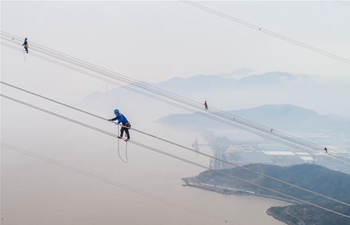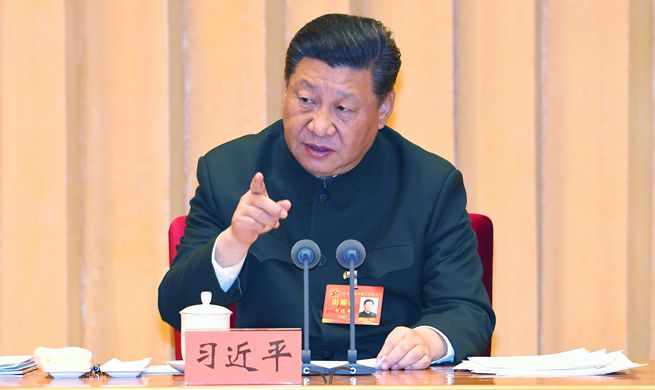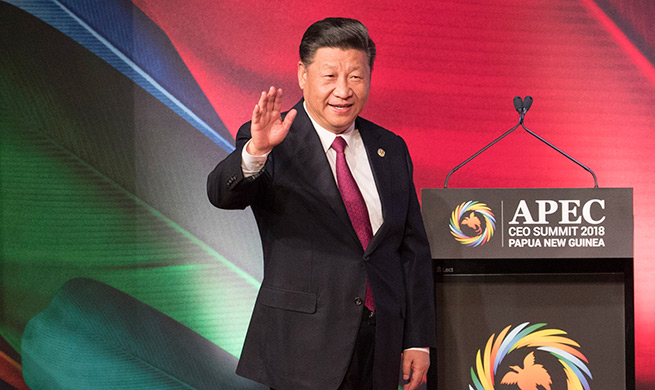by Xinhua writer Yuan Quan
BEIJING, Jan. 5 (Xinhua) -- Chinese researchers have taken a major step forward in developing a new-generation vaccine that has the potential to protect against almost all of the most potentially lethal forms of human papilloma virus (HPV).
HPV is primarily transmitted through sexual contact. More than 200 distinct HPV types have been identified, of which at least 18 are high-risk types associated with 99 percent of cervical cancers, the second most common cancer among women, after breast cancer.
Gardasil 9 is the current market-available HPV vaccine providing the broadest protection against infection from nine HPV types, seven of which can cause 90 percent of cervical cancers.
However, it remains unclear whether widespread immunization with vaccines like Gardasil 9 could lead to an increase in infection rates from the other cancer-related HPV types, responsible for the remaining 10 percent of cervical cancers.
To expand type coverage, the approach used in previous-generation vaccines was to increase the number of virus-like particles. One particle resembles one HPV type, and it can elicit immunity to one HPV type. The more particles a vaccine has, the broader protection it provides.
However, this approach is fraught with difficulties, as an increase in type coverage will dramatically enhance protein amounts and immunological agent levels per dose, which will cause side effects, such as pain, swelling and fever, and raise the manufacturing complexity and production costs.
Researchers at Xiamen University, in east China's Fujian Province, have developed a highly effective vaccine candidate that can protect against more HPV types with fewer particles.
They divided 20 major HPV types, including HPV6 and HPV11, which accounts for 90 percent of genital warts, into seven groups based on genetic relationships, and found that genetically close HPV types shared high structural similarities.
Xia Ningshao, lead researcher, compared the virus or the vaccine to a "ball". All HPV types are similar in appearance, but are significantly different in the surface of the "ball", such as veins, convex and concave areas. These structural features on the surface are called loops.
"Because of the loops, one type of vaccine can stimulate the production of antibodies only against the infection of one type of virus, and is unable to prevent the infection of other types," he said.
Using a loop swapping approach, researchers engineered a complex virus-like particle with the loops of three genetically close HPV types: HPV33, HPV58 and HPV52.
They tested the triple-type particle in experiments on mice and monkeys, and found it could provide high immune potency comparable with a combination of three virus-like particles.
The new approach was equally successful in developing another four triple-type particles using the other 12 major HPV types.
"The research paves the way for an improved HPV vaccine made of seven-type virus-like particles to protect against as many as 20 HPV types," said Xia.
The results were recently published in the international Nature Communications journal. Reviewers said the new-generation vaccine candidate was "a remarkable achievement" for having broader type coverage, lower cost and lower amounts of proteins and agents, and "will be moved forward into a clinical trial."
Three HPV vaccines have been introduced to China, covering two, four and nine types. The three-shot HPV vaccination covering nine types is priced for 3,894 yuan. In some areas, scalpers sell it for over 6,000 yuan, which is prohibitive for many poor women.
Researchers say the new-generation vaccine candidate will be available for women aged 9 to 45. Its cost will not exceed the current market-available vaccines.
Two HPV vaccines previously developed by the Xiamen University have reached the clinical test stage and are expected to enter the market in 2019 and 2022.
The world's first HPV vaccine, Gardasil, was developed by Chinese cancer researcher Zhou Jian and Australian immunologist Ian Frazer. In 1995, Zhou and Frazer started cooperating with Merck and Co. to develop the vaccine. After Zhou's sudden death from hepatitis in 1999, Frazer continued the work until the vaccine was ready for market.
According to the World Health Organization, about 570,000 new cases and 311,000 deaths of cervical cancer are reported worldwide every year. China has a very high incidence and death rate, with 106,000 new cases reported and about 48,000 deaths in 2018.
Cervical cancer can be fatal. HPV vaccination has been promoted in China in recent years. Women are also advised to prevent the disease through regular health checks.

















